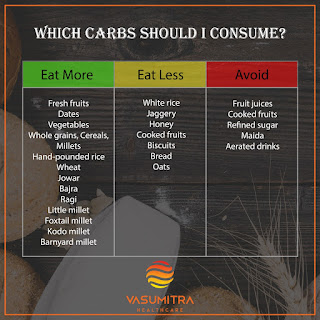Are Carbohydrates healthy?
Ask almost anyone what they
need to do to lose a few kilos, and they’ll say: “Cut back on the
carbs.” As a nutrition coach, I’ve heard it hundreds of times.
Are carbs less important than protein, fat, and the many micronutrients
that contribute to our health?
Can a low-carb diet work to help people lose weight?
Here are my views on it:
Carbs, or
carbohydrates, are molecules that have carbon, hydrogen and oxygen atoms. In
nutrition, "carbs" refers to one of the three macronutrients. The
other two are protein and fat. The main purpose of
carbohydrates in the diet is to provide energy. Most carbs get broken down or
transformed into glucose, which can be used as energy. Carbs can also be turned
into fat (stored energy) for later use.
4 reasons
to consume carbohydrates:
1.
It is the easiest and fastest source of energy
2. Glucose is the only source of energy for the brain and
its absence can cause headache, irritability etc. Carbohydrates are required
for the production of serotonin required to balance mood, sleep cycle and bowel
movements.
3. Liver and muscles store carbohydrates in the form of glycogen.
These storage forms are used when performing physical activity
4. Foods rich in carbohydrates are a source of B vitamins
which are required in each and every biochemical reaction.
According to the U. S. Department of Agriculture
(USDA) Dietary Guidelines for Americans 2005, the best
carbohydrates are those that contain a lot of fiber, like vegetables, fruits,
and whole grains. These types of carbohydrates take longer to break down into
glucose and give you the most nutrients along with your calories. Do you know the consequences of not eating sufficient
carbs?
a. impaired mood and cognitive function because of insufficient supply of glucose to the brain
b.
a stopped or irregular menstrual
cycle
c.
lowered fertility
d.
hypoglycaemia and blood sugar
swings
e.
more body fat (especially
around the middle)
f.
loss of bone density
g.
anxiety, depression, and other
mental health issues
A Recent study conducted in
Netherlands for the effect of carbohydrate content in diet on muscle recovery
showed that:
- a high carb diet (85% carbs);
- a medium carb diet (44% carbs); and
- a low carb diet (2% carbs).
“the low carb diet lead to muscle
loss: When you get enough carbs to meet your needs, you replenish muscle
glycogen and create an anabolic (building-up) hormonal environment. In the
absence of sufficient carbs, muscles are used for generating energy.”
So carbs when consumed correctly, have a lot of benefits.







Comments
Post a Comment